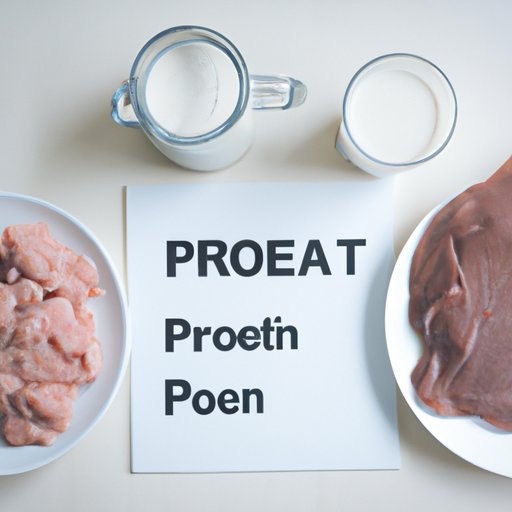
I. Introduction
Gaining weight is a common goal for individuals who want to increase muscle mass and improve their overall health. One of the key factors in achieving this goal is consuming an adequate amount of protein. However, there is often confusion around how much protein is necessary for weight gain. This article aims to provide comprehensive guidance on protein intake to help readers achieve their weight gain goals.
II. The Importance of Protein in Gaining Weight: Understanding the Basics
Protein is an essential macronutrient that plays several vital roles in the body, such as building and repairing tissues, producing enzymes and hormones, and supplying energy. In terms of weight gain, protein is critical for muscle growth and repair. Resistance training, such as weight lifting, causes micro-tears in muscle fibers. Protein helps repair these tears, leading to muscle growth and increased strength.
III. How Much Protein Should You Really Be Eating to Pack on the Pounds?
The recommended daily protein intake for adults is 0.8 grams per kilogram of body weight, or 0.36 grams per pound. However, individuals who want to gain muscle mass may need more protein. Factors that may affect an individual’s protein needs for weight gain include body weight, age, and activity level. A general guideline for optimal protein intake for muscle gain is 1.6-2.2 grams per kilogram of body weight.
IV. Maximizing Protein Intake for Optimal Muscle Gain
Protein timing and distribution throughout the day are essential for muscle growth. Consuming protein shortly after exercise can help optimize muscle protein synthesis. Combining protein with carbohydrates and healthy fats can also help promote weight gain. Examples of high-protein foods include lean meats, fish, eggs, dairy, beans, and nuts. Meal planning and preparation ideas can help individuals incorporate protein into their diets.
V. Protein Recommendations for Weight Gain: A Comprehensive Guide
Based on an individual’s body weight and activity level, a comprehensive and easy-to-read chart can provide recommended protein intake. This chart can aid individuals in determining how much protein they need to achieve their weight gain goals.
VI. The Best High-Protein Foods for Building Muscle Mass
A variety of high-protein foods can help promote muscle growth. Examples include chicken, turkey, beef, fish, eggs, dairy, lentils, chickpeas, quinoa, and nuts. These foods can be prepared in various ways, such as grilling, baking, or blending in a smoothie. Incorporating multiple protein sources can provide a well-rounded nutrient profile.
VII. The Role of Protein Supplements in Weight Gain
Protein supplements, such as whey protein and plant-based protein powders, can help individuals achieve their protein goals. However, the quality and safety of supplements can vary. It is essential to choose a reputable brand and read labels carefully. Incorporating whole food protein sources is always the best approach, but protein supplements can have a place in an overall balanced diet.
VIII. Balancing Protein, Carbs, and Fat to Hit Your Weight Gain Goals
While consuming enough protein is essential for weight gain, it is also important to balance carbohydrate and fat intake. Carbohydrates provide energy for exercise and recovery, while healthy fats support hormone production and absorption of certain vitamins. General guidelines for carbohydrate and fat intake can help individuals achieve their weight gain goals. Meal planning and snack ideas can ensure that all three macro-nutrients are included.
IX. Conclusion
Protein is a crucial nutrient for gaining weight and building muscle mass. By utilizing comprehensive guidelines and tips for protein consumption, individuals can optimize their nutrition and achieve their weight gain goals. Incorporating high-protein foods and quality supplements, balancing macronutrient intake, and using meal planning and preparation techniques can all contribute to a healthy and successful weight gain journey.





